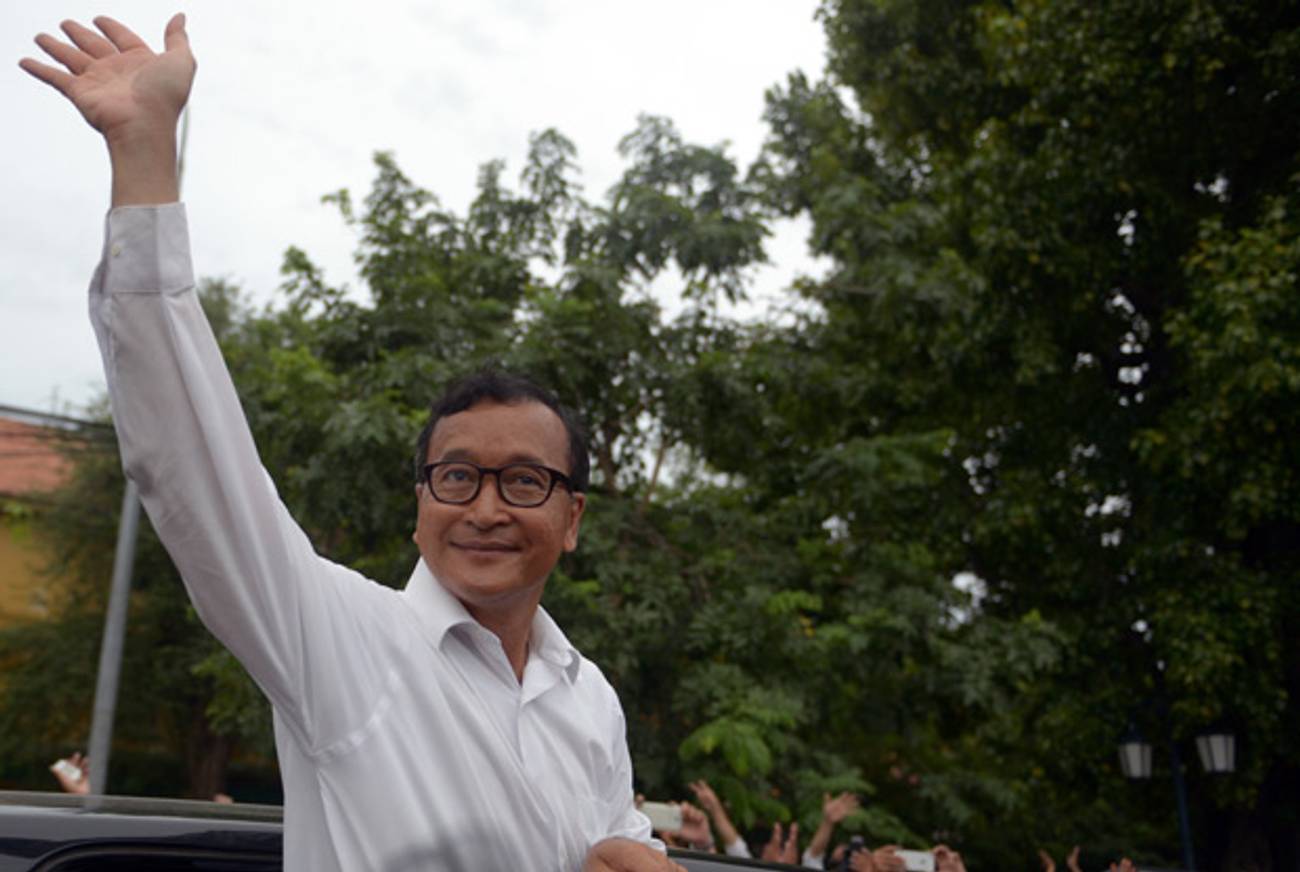Cambodian Opposition Leader’s Jewish In-Laws
Sam Rainsy’s daughter marries fellow Yale grad William Rubenstein




This might sound odd, but one of the things I like about living in Cambodia is that I’m not compelled to talk about Jews or Judaism. In the Middle East, where I spent a few years after college, the subject came up frequently, whether in relation to conspiracy theories, Israel, or just out of plain curiosity. In Jordan, Egypt, Lebanon, and Syria, if Jews weren’t physically present in my day-to-day life, they had a habit of popping up in conversation.
Not so in Buddhist Cambodia, where I’ve had few unbidden Jewish-themed chats in more than a year’s residence. One was with a Cambodian friend who wanted to see if there was really a connection between being Jewish and being smart. The other occurred at a bar, when a foreign journalist and I argued about the health benefits of circumcision.
So I was surprised when, earlier this week, I got an email from an uncle in Florida that managed to mash Cambodia and Judaism together in an unexpected way.
“Hot news,” he began. “Sam Rainsy’s daughter married a Jewish boy today in Boston. He starts medical school in September. It was in the wedding announcements of the Sunday Times.”
Sam Rainsy is the head of the opposition Cambodia National Rescue Party, which just took a bite out of Prime Minister Hun Sen’s ruling Cambodian People’s Party in parliamentary elections on July 28. He’s been written about in the English language newspaper I work for, as well as in several others, almost every day since the poll.
Naturally, he’s been on my mind, but in the context of Cambodian politics. This tidbit had a personal touch. I opened a link to the August 11 wedding announcement and read the first paragraph:
Rachel Estée Sam and William Josiah Rubenstein are to be married Sunday at the Boston Harbor Hotel in Boston. Rabbi Moshe Waldoks will officiate, incorporating blessings in Hebrew, English, French and Cambodian. On Saturday a traditional Khmer wedding celebration was held at the Sunny Da restaurant in Lowell, Mass., that included a pairing ceremony, during which ribbons representing blessings were tied on the wrists of the bride and groom.
Amid the political stalemate, a few brief reports trickled out on Rainsy scooting off to the U.S. to attend his daughter’s wedding. The opposition, despite nearly doubling its presence in the 123-seat National Assembly, still lost the election. Rainsy, who has been posting statements on his Facebook page while away, and others have been calling for mass protests should allegations of widespread voter fraud fail to be credibly investigated. On election day there were small-scale riots, and $4 million was withdrawn from banks, about double the regular daily amount. At the end of last week, armed units were mobilized in Phnom Penh.
I hadn’t given Rainsy’s trip much thought beyond the awkward timing of the departure—you’re leaving now?—but the Times announcement got me thinking about the opposition leader and his new Jewish in-laws in America. As I reported in February, the U.S. Holocaust Memorial Museum in Washington, D.C. plans to open its first display about the Khmer Rouge, whose policies lead to the deaths of almost two million people from 1975 to 1979. The Holocaust and the Khmer Rouge regime’s project of mass killing established thematic connections between the Jewish and Cambodian experience, and Rainsy, who comes from a Buddhist background, has never shied away from the similarities. In Chapter 11 of his campaign memoir, We Didn’t Start the Fire: My Struggle for Democracy in Cambodia, which was published earlier this year, he includes a quote attributed to Dith Pran, the Cambodian New York Times reporter who survived the Khmer Rouge and was portrayed in the film The Killing Fields: “The Jewish people’s search for justice did not end with the death of Hitler and the Cambodian people’s search for justice doesn’t end with Pol Pot,” it reads, referring to the Khmer Rouge leader.
The chapter is largely about Cambodian refugees, the challenges of exile and starting anew abroad. Rainsy first left Cambodia as a kid in the mid-1960s after his father, Sam Sary, fled across the border to escape political persecution. Sary was later killed in Laos, Rainsy believes, by the same anti-government movement that had helped him escape. Rainsy settled in France with some relatives, grew up, fell in love, married, entered the finance industry, and started his own family—his wife, Tioulong Saumura, is a parliamentarian in Phnom Penh.
In 1991, Rainsy returned to Cambodia after 25 years abroad. He became finance minister, but says he was yanked from the post in 1994 after accusing Cambodia’s senior leaders of being responsible for deforestation. In a colossal act of chutzpah, he started a political movement named after himself, the Sam Rainsy Party. The merger with another movement last year would result in the Cambodia National Rescue Party contesting the most recent election.
The wedding made the local blogs here, but the Jewish connection was largely ignored. Watching the video of the celebration online, I saw the family tying the red strings in traditional Buddhist fashion around the couple’s wrists to symbolize the bond. In later pictures, relatives in yarmulkes circle up, and Rainsy claps in the background. In one of the photos, I saw his wife being hoisted up on the chair.
At the tying ceremony, Rainsy took the stage with his daughter, his wife, his new son-in-law and in-laws, and gave a short speech.
“We wish them happiness for the whole of their adult lives, many satisfactions, and of course, many children!”
That’s something my dad would say.
Previous: Not for Our Tragedy Alone
Related: A Jewish Encounter With Cambodia
Joe Freeman is a Southeast Asia-based journalist whose work has appeared in The Washington Post, Foreign Policy, The Guardian, The Christian Science Monitor, The Phnom Penh Post, and the Nikkei Asian Review.